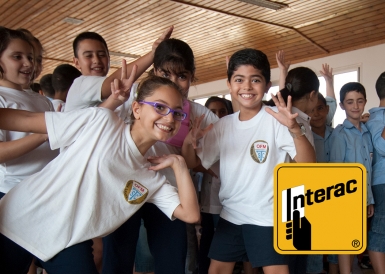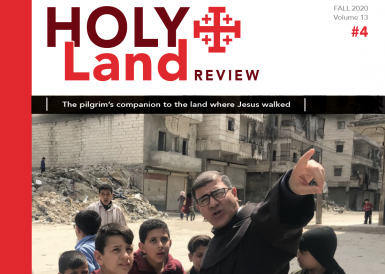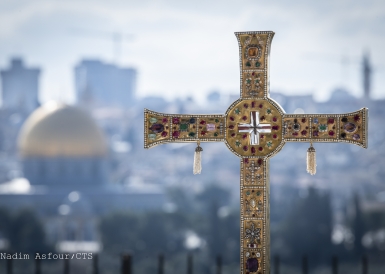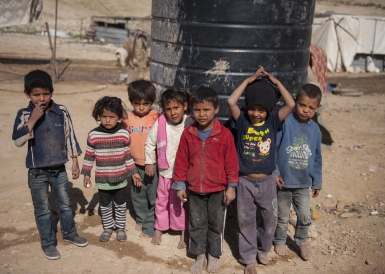
Daniel, a 31-year-old Palestinian Christian, is the managing director of Musalaha, a Christian NGO which has established a reconciliation theory and applies it to the Israeli-Palestinian conflict. After a brilliant academic career in Anglo-Saxon countries, he chose to return to Jerusalem, where he believes his presence will be more useful.
- By Cécile Lemoine
What motivated your return to the Holy Land?
My studies familiarized me with the different theologies of liberation and reconciliation. I asked myself, as a Christian, whether I wanted to dedicate my life to doing good, to trying to have a positive footprint, here or in London; where would I be more effective? Clearly, it was here, because of my identity, my background, and my language skills, but also my network. All the same, I had to reflect on this, because I had great job offers in London. It was tempting to stay. It is easier to build your life outside the Holy Land: there are fewer social, financial, political difficulties ... But I always knew that it was necessary to return, precisely because Christians leave and create a brain drain. There was a sense of obligation, somehow, even if I have always considered my faith to be linked to this people and this land. Palestinian Christians are an important component of the movement towards justice and liberation for all Palestinians.
So Christians have a role to play in the Holy Land?
 Yes of course. The question is what that role is and what position we want to take. Today many Christians isolate themselves, avoid confrontation and do not interact with other communities. Some Christians, often rich and secular, consider everyone to be the same, without recognizing the differences between groups. Others want to please the powerful, such as some evangelical Palestinians, or those "Aramaic" Christians who enlist in the Israeli army to integrate into Israeli Jewish society. Some opt for violence or reject anything related to Israel. I believe that we Christians have a moral responsibility to our Israeli Jewish neighbors, to free them from their racism. We must confront them, explain to them why this supremacism harms their society as much as ours. Our role is an alternative one, that of reconciliation.
Yes of course. The question is what that role is and what position we want to take. Today many Christians isolate themselves, avoid confrontation and do not interact with other communities. Some Christians, often rich and secular, consider everyone to be the same, without recognizing the differences between groups. Others want to please the powerful, such as some evangelical Palestinians, or those "Aramaic" Christians who enlist in the Israeli army to integrate into Israeli Jewish society. Some opt for violence or reject anything related to Israel. I believe that we Christians have a moral responsibility to our Israeli Jewish neighbors, to free them from their racism. We must confront them, explain to them why this supremacism harms their society as much as ours. Our role is an alternative one, that of reconciliation.
Reconciliation. This is the translation of the name of your organization, "Musalaha." What do you do there?
It's a way to rebuild the relationship. For reconciliation to take place, four elements have to come together: truth, justice, historical accountability, and the examination of legal and power structures in order to restructure a framework where everyone enjoys full equality of opportunity. This is far from being the case today, so we are working toward this through courses, programs to bring together Christians and Muslims, Palestinians and Israelis that are based on the biblical principles of reconciliation. We direct ourselves to women, young people, civil society leaders ... Reconciliation is a constructive path to achieving justice and liberation for Palestinians, without this being at the expense of Israeli Jews.
What vision, what dream do you have for the Holy Land?
That all the inhabitants of this land live together with full equality in terms of civil and human rights. That each community is able to express and celebrate its identity, without doing so at the expense of others. This is impossible at the present time, in this context of a Zionist and colonizing project. The dream must come from Israeli Jews. But they need to rethink their project and their identity. There will be no solution without them.
Why Him? He can speak to the differences

Daniel's passion for justice also leads him to engage on the ground as here at the Tent of Nations in Bethlehem.
Born in Jerusalem to a Palestinian Christian father who was an Israeli citizen and a British mother, Daniel was educated at an Israeli Jewish day school before studying management at Durham University in the United Kingdom and then international and religious relations at American University in Washington D.C. Because he understands and navigates the Israeli Jewish, Palestinian and international worlds alike, Daniel tries to build bridges between each. In May 2022, the United Nations Security Council invited him to speak about reconciliation at a briefing on the situation in the Middle East.



